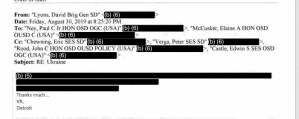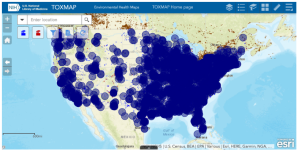Unredacted Ukraine Emails Show FOIA Exemption 5 Abuse, Court Rules Contractor Diversity Data Can’t be Hidden by Exemption 4, and More: FRINFORMSUM 1/13/2020
 Unredacted Ukraine Emails Cast Doubt on Exemption 5 Invocation
Unredacted Ukraine Emails Cast Doubt on Exemption 5 Invocation
A recent Just Security article from Citizen and Responsibility for Ethics in Washington’s (CREW) Anne Weismann provides a powerful argument for reforming FOIA Exemption 5, often called the “withhold it because you want to” exemption, “to mirror how the deliberative process privilege is treated in the discovery context.” Such a reform would require agencies and the courts to balance the “quality of [the government’s redaction] decisions against the public’s interest in disclosure.” (Exemption 5 is a discretionary exemption that allows agencies to withhold any “interagency or intra-agency communication,” as well as any agency-claimed “draft,” from the public.) Weismann compares a series of emails from key Defense and administration officials that were blanketed in Exemption 5 redactions and released in response to a court order to unredacted versions of the same emails that were obtained by Just Security to make her case. The unredacted versions “suggest the government invoked Exemption 5 not to protect an internal deliberative process, but to keep from the public compelling evidence of the president’s misconduct and abuse of power and the complicity of administration officials in his actions.” Weismann goes on to argue that Congress should “provide the public with a more effective tool by reforming the FOIA to ensure the public’s interest in requested documents factors into an agency’s and reviewing court’s consideration.”

Kandis A. Westmore
Court Says Contractor Diversity Data Can’t be Hidden By Exemption 4; Government Failed to Satisfy Foreseeable Harm Burden
U.S. District Court Judge for the Northern District of California, Judge Kandis A. Westmore, has ruled that the Labor Department must release federal contractor workforce demographic data in response to a FOIA request. Agency attorneys tried to argue that the contractors’ diversity data is commercial and would result in financial harm if released, and was therefore properly withheld under FOIA’s Exemption 4, but the court rejected that argument. The decision is the first to require a federal agency to disclose employer information following the Supreme Court’s June 2019 ruling in Food Marketing Institute v. Argus Leader Media, a ruling that broadened the scope of Exemption 4.
Judge Westmore also notably ruled that, “Even if the information was exempt, the Government has failed to carry its burden of showing that foreseeable harm would result should the documents be released.” Westmore goes on to note, “The foreseeable harm standard prohibits agencies from withholding information unless (1) the agency reasonably foresees that disclosure of the record would harm an interest protected by an exemption, or (2) the disclosure is prohibited by law. 5 U.S.C. § 552(a)(8)(A)(i) . Consequently, even if information falls within the scope of a discretionary exemption, it cannot be withheld from the public unless the agency also shows that disclosure will harm the interest protected by that exemption. Id .; see also Judicial Watch, Inc. v. U.S. Dep’t of Commerce, 375 F. Supp. 3d 93 , 98 (D.D.C. 2019).”
 Dismantling of ToxNet and Retiring of ToxMap is a Step Backwards for Environmental Transparency
Dismantling of ToxNet and Retiring of ToxMap is a Step Backwards for Environmental Transparency
The National Library of Medicine has retired ToxNet, the Toxicology Data Network that served “as an integrated system of toxicology and environmental health information.” While some databases will be incorporated into other resources in order to comply with the Emergency Planning and Community Right-to-Know Act, TOXMAP, “the revelatory environmental mapping tool” that allowed Americans to see what toxins were released in every zip code across the United States – in addition to associated health risks – will not find a new home. ToxMap began in 2004 to share information from the Environmental Protection Agency, and, “As the interface improved over the early 2010s, the NLM also added geographic information on cancer (from the National Cancer Institute) and mortality rates (from CDC’s National Center for Health Statistics), thereby adding to the factual contexts which ToxMap could furnish to help communities frame an effective understanding of their environmental dilemmas and concerns.”
Visit the Environmental Data and Government Initiative website for a comprehensive report on the history of ToxMap and how it fits into a “larger pattern of decreasing transparency of environmental data during the Trump era.” (The New York Times also maintains an updated list of environmental rules and regulations that have been rolled back under the Trump administration – the count as of writing this is 95.)
Interior Dept. FOIA Overhaul Continues
Interior Department Secretary David Bernhardt has approved (pursuant to Oder No. 3378) a slew of changes to the agency’s FOIA program, including “Establishing a FOIA Litigation Unit and consolidating FOIA litigation activities”. GreenWire points out that the order also establishes a new Departmental FOIA Office, puts FOIA personnel (identified as Interior employees with any role in processing or reviewing records) under direct control of the Office, and “states that the FOIA office can ‘assert control over any aspect of any FOIA request.’”
While Interior says the changes are necessary to respond to a drastic increase in FOIA requests to the agency, advocates worry that the realignment will place the FOIA process more firmly in the hands of political appointee and Interior Solicitor, Daniel Jorjani, whom Sen. Ron Wyden (D-Or.) accused of perjuring himself before the Judiciary Committee when discussing the agency’s controversial new “awareness review” policy for FOIA requests. (The awareness review policy allows political appointees to review records to be released under FOIA – and the discretion to say which documents should or shouldn’t be released.)
DoD Begins Classifying Southwest Border Orders
The Defense Department is now classifying requests for assistance from the Department of Homeland Security for continued support at the U.S.-Mexico border. The orders have historically been unclassified. Newsweek reports that the policy shift comes from Lieutenant General Laura J. Richardson and is “in response to negative news coverage and leaks of border documents under U.S. Army North’s previous commander, Lieutenant General Jeffrey S. Buchanan.” Newsweek also cites Pentagon sources saying verbal commands have increased under Richardson’s tenure, ostensibly to avoid creating a paper trail; one Customs and Border Protection official said that while Buchanan aimed to keep as much of the border mission unclassified as possible, Richardson said “Move the mission to SIPR.” (SIPRNet is the DoD and State Department’s classified network.)
Sign Up
Want to stay on top of the latest FOIA news? Click here to sign up for our weekly FRINFORMSUM (Freedom of Information Summary) email newsletter.
Comments are closed.

It is sad that civilians suffer through political strife.